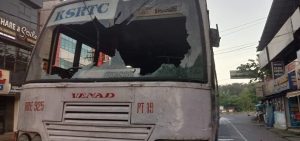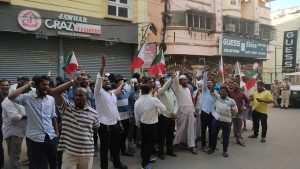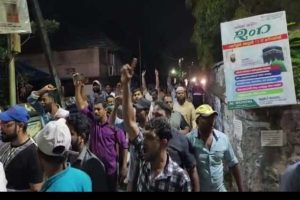Barely 16 years old, PFI has been on the radar of central agencies, its leaders tracked by investigation wings and its members arrested in various cases.

PFI and SDPI offices raided across multiple states in the country on Thursday, 22 September. (South First)
Prof P Koya, founder, Popular Front of India (PFI), OMA Salam, PFI chairman, EM Abdul Rahiman, PFI vice-chairman, Anis Ahmed, PFI general secretary, and E Abubacker, founder-president of the Social Democratic Party of India (SDPI), the PFI’s political arm.
All these men are among the 45 people the National Investigation Agency (NIA) claimed to have arrested on Thursday following nationwide raids. Reports suggest that the number of those detained is well over 100.
The focused targeting of the PFI-SDPI and its leaders is being seen as the first step towards banning the outfits.
Central agencies swooped down on the PFI and SDPI in at least 93 locations across the country. In one swoop, the NIA, along with the Enforcement Directorate (ED) and state police forces, arrested the top leadership of the radical Islamist outfit — every single decision-making member — giving the organisation no space and time to react.
The raids had been in the pipeline for weeks, but the intent to go after the PFI has been marinating for years.
Barely 16 years old, the outfit has been on the radar of top central agencies for quite some time now. PFI’s leaders have been tracked by state and central investigation units and its members have been arrested in various cases across the country.
For years now, various state governments and political parties have demanded a ban on PFI. Several agencies, including ED, have searched places linked PFI’s leaders multiple times.
In the face of what PFI deems a “witch-hunt”, the outfit has grown stronger and more widespread.
“Nobody likes an assertive, unapologetic Muslim. At PFI, we have a strong voice, we have resources and we fight for the cause of oppressed minorities,” Anis Ahmed had told this reporter months before NIA arrested him.
Ask the investigation agencies and they insist that the PFI has been attempting to create unrest in the country for years, communally inciting Muslims.
According to PFI’s website, it was officially launched in 2006.
Three outfits — National Development Front (NDF) from Kerala, Karnataka Forum for Dignity (KFD), and Manita Neethi Parasai (MNP) of Tamil Nadu — merged to to create the PFI.
Several founding members of the PFI — EM Abdul Rahiman, E Abubacker, Prof Koya, for instance — were members of the now-banned Student Islamic Movement of India (SIMI). Prof Koya as also the founding member of the NDF.

The PFI members allegedly damaged the public transport bus during the protest in the state (Supplied)
PFI leaders insist that the outfits that merged to make the organisation came into being following the rise of “Hindutva fascism”, especially in the aftermath of the Babri Mosque demolition by Hindutva outfits led by BJP leader LK Advani in 1992.
Three years after its launch, other outfits like Goa’s Citizen’s Forum, Rajasthan’s Community Social and Educational Society, West Bengal’s Nagarik Adhikar Suraksha Samiti, Lilong Social Forum from Manipur, and Association of Social Justice from Andhra Pradesh merged with PFI in 2009.
Investigative agencies insist that cadres of SIMI shifted enmasse to PFI after the former was banned.
“I was at their launch event. We backed the PFI under the impression that they are a forum for peace, but after the hand-chopping case of Prof TJ Joseph in Kerala, we withdrew from PFI. Their ideas were violent,” Suresh Bakrabail Bhat, former member of the Karnataka Communal Harmony Forum told South First.
Bhat was referring to the infamous hand-chopping case over alleged blasphemy in Kerala’s Idukki district in 2010 — the first time PFI made national headlines for a violent crime.

Supporters of the PFI protested against the NIA raids on the organisation in Karnataka and Kerala. (Screen Grab)
PFI has vehemently denied inciting violence, in that case as well as others.
“Some of our workers may have been arrested over suspicion of committing crimes but that doesn’t mean we as an outfit encouraged them to do so,” Prof Koya, the grand old man and brain behind of PFI, had told this reporter. Prof Koya, now 69, is currently in NIA custody.
PFI has also been often accused by various agencies of illegal religious conversions via its educational institutions like the Sathya Sarani in Mallappuram, sponsoring anti-CAA-NRC agitations across the country, inciting communal violence in several places like DJ Halli violence in Bengaluru, and providing arms training illegally to cadres.
ED, CBI, NIA, and the Intelligence Bureau (IB) have been filing one dossier after another on the PFI and its activities to the Union government for years.
In April 2021, the Union government told Supreme Court that it was in the process of banning PFI.
“We make arrests, we know they are from PFI, we get them convicted but unfortunately, since they are not card-carrying members of the outfit, authorities find it difficult to hold the outfit responsible for individual’s actions. At most, one can claim conspiracy,” a senior police officer from Karnataka said, explaining the investigating challenges.
This time around, the NIA has left no stone unturned to target the topmost leaders of PFI.
The PFI currently has an official cadre strength of four lakh. This number excludes supporters, donors, patrons who have been helping the outfit with resources.
What started as a small outfit in Kerala’s Malabar region, now has a presence in over a dozen states in India. In 2022 alone, PFI organised mass events in West Bengal, Maharashtra, Rajasthan, Tamil Nadu, Goa, Karnataka and Kerala.

The raids on PFI began in the wee hours of Thursday, sparking protests in Karnataka and Kerala. (Screen Grab)
PFI’s student wing, the Campus Front of India (CFI), has practically taken over as the primary rival of the ABVP — the student wing of the RSS — in the coastal districts of Karnataka with Congress’ NSUI out of the picture in a heavily polarised region.
Members of CFI led the protests over the hijab ban in coastal Karnataka.
PFI’s political wing, the SDPI, has even managed to win seats in local body elections of coastal Karnataka districts — again replacing the Congress as the primary challenger to the BJP.
Agencies that have studied the modus operandi of PFI claim that the outfit targets poor and underprivileged Muslims. PFI has often taken pride in extending legal aide to Muslims arrested for various issues, but don’t understand the legal process or can’t afford court fees.
PFI offers scholarships to poor Muslims students for journalism and law courses — an attempt to have more educated Muslim youths indebted to the outfit in the fields of journalism and law.
PFI members have been raided by ED in the past, but the outfit claims that all its funding comes from donations from within the community.
PFI has often claimed to be an outfit working towards the upliftment of Pasmanda Muslims — the most backward and oppressed classes among Muslims — a section of the community that has least social and political representation within the already small sphere of Muslim political leadership.
Thursday’s raids by central agencies came at a time the PFI was keen on launching a women’s wing and expanding its foothold further.

May 01, 2024

May 01, 2024

May 01, 2024

May 01, 2024

May 01, 2024

May 01, 2024